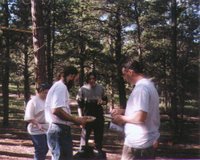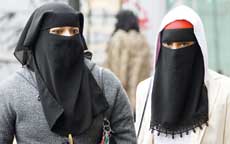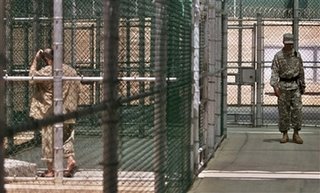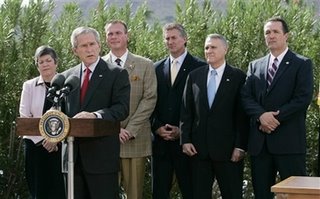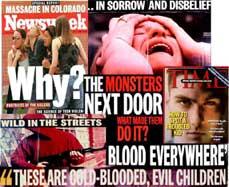 October 2, 2006Introduction/ Conclusion
October 2, 2006Introduction/ Conclusion
by Housewife4PalestineUpon reading the following article which I find appalling, makes one think I sure wouldn’t wish to send my children through the American school system and for you people that wish facts; here they are:List of Some Fatal U.S. School ShootingsBy The Associated Press A list of some fatal shootings at U.S. schools in recent years:_ Oct. 2, 2006: A gunman took about a dozen girls hostage, killing at least three of them, at a one-room Amish schoolhouse in Pennsylvania's Lancaster County, police said. The shooter was among the dead, and a number of people were injured."It was the nation's third deadly school shooting in less than a week, and it sent shock waves through Lancaster County's bucolic Amish country, a picturesque landscape of horse-drawn buggies, green pastures and neat-as-a-pin farms, where violent crime is virtually nonexistent."
4 dead in Amish school shooting in Pa.  This still image taken from video shows the scene of a schoolhouse (top) shooting in an Amish community school near rural Lancaster, Pennsylvania October 2, 2006. A gunman attacked the one-room Amish school in Pennsylvania shooting and killing three girls and wounding seven others before killing himself, police said. (Courtesy WCAU/Handout/Reuters)
This still image taken from video shows the scene of a schoolhouse (top) shooting in an Amish community school near rural Lancaster, Pennsylvania October 2, 2006. A gunman attacked the one-room Amish school in Pennsylvania shooting and killing three girls and wounding seven others before killing himself, police said. (Courtesy WCAU/Handout/Reuters)
 Amish men listen Monday to Pennsylvania State Police Commissioner Jeffrey Miller describe what happened at the schoolhouse near Nickel Mines, Pa.
Amish men listen Monday to Pennsylvania State Police Commissioner Jeffrey Miller describe what happened at the schoolhouse near Nickel Mines, Pa.
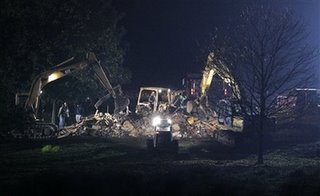 The Amish school in Nickel Mines, Pa., where a gunman shot 10 girls last week, killing five of them, is demolished by private contractors before dawn Thursday, Oct. 12, 2006. (AP Photo/Matt Rourke)
The Amish school in Nickel Mines, Pa., where a gunman shot 10 girls last week, killing five of them, is demolished by private contractors before dawn Thursday, Oct. 12, 2006. (AP Photo/Matt Rourke)
_ Sept. 29, 2006: 15-year-old Eric Hainstock brought two guns to a school in rural Cazenovia, Wis., and fatally shot the principal, a day after the principal gave him a disciplinary warning for having tobacco on school grounds, police said.
_ Sept. 27, 2006: Duane Morrison, 53, took six girls hostage at Platte Canyon High School in Bailey, Colo. Morrison, sexually assaulting them and using them as human shields for hours before fatally shooting one girl and killing himself.
_ Aug. 24, 2006: Christopher Williams, 27, went to an elementary school in Essex, Vermont, looking for his ex-girlfriend, a teacher. He couldn't find her and fatally shot one teacher and wounded another, police said. Williams also killed his ex-girlfriend's mother, according to authorities. He shot himself twice in the head after the rampage and was arrested.
_ March 21, 2005: Sixteen-year-old Jeff Weise shot and killed five schoolmates, a teacher and an unarmed guard at a high school on the Red Lake Indian Reservation in Minnesota before taking his own life. Weise had earlier killed his grandfather and his grandfather's companion.
_ Nov. 22, 2004: Sixteen-year-old Desmond Keels is accused of fatally shooting one student and wounding three others outside Strawberry Mansion High in Philadelphia. The attack apparently was over a $50 debt in a rap contest. Keels is set to stand trial on murder charges later this month.
_ April 24, 2003: 14-year-old James Sheets shot and killed the principal in the crowded cafeteria of a junior high school in south-central Pennsylvania, before killing himself.
_ May 26, 2000: 13-year-old Nathaniel Brazill killed his English teacher on the last day of classes in Lake Worth, Fla., after the teacher refused to let him talk with two girls in his classroom. He was convicted of second-degree murder and is serving a 28-year sentence.
_ April 20, 1999: Students Eric Harris, 18, and Dylan Klebold, 17, killed 12 students and a teacher and wounded 23 before killing themselves at Columbine High School in Littleton, Colo.
 Eric Harris and Dylan Klebold (the two students who carried out the rampage) caught on the high school's security cameras in the cafeteria shortly before committing suicide.
Eric Harris and Dylan Klebold (the two students who carried out the rampage) caught on the high school's security cameras in the cafeteria shortly before committing suicide.
 A sign in front of Columbine High School sets the tone for the fifth anniversary of the worst school shooting in U.S. history: "A Time to Remember, A Time to Hope."
A sign in front of Columbine High School sets the tone for the fifth anniversary of the worst school shooting in U.S. history: "A Time to Remember, A Time to Hope."
_ May 21, 1998: Two teenagers were killed and more than 20 people hurt when a teenage boy opened fire at a high school in Springfield, Ore., after killing his parents. Kip Kinkel, 17, was sentenced to nearly 112 years in prison._ May 19, 1998: Three days before his graduation, an honor student opened fire at a high school in Fayetteville, Tenn., killing a classmate who was dating his ex-girlfriend. Jacob Davis, 18, was sentenced to life in prison._ March 24, 1998: Two boys, ages 11 and 13, fired on their Jonesboro, Ark., middle school from nearby woods, killing four girls and a teacher and wounding 10 others. Both boys were later convicted of murder and can be held until age 21._ Dec. 1, 1997: Three students were killed and five wounded at a high school in West Paducah, Ky. Michael Carneal, then 14, later pleaded guilty but mentally ill to murder and is serving life in prison._ Oct. 1, 1997: Sixteen-year-old Luke Woodham of Pearl, Miss., fatally shot two students and wounded seven others after stabbing his mother to death. He was sentenced the following year to three life sentences. Conclusion
Conclusion I am wondering how much violence is going on in the American school system that never ends up in the above manner.
From parents and teacher’s I have talked to, quite a lot and just think this is the future of America?
I am sad to say, this is not the world we should be living in!
The continuous trend of private schooling and home schools not only because of the violence, but the increase in immorality in American schools; I am sure is hurting the public school system.
The atmosphere of violence and immorality in the public school system, I am thinking has to affect the quality of education for the students attending.
______________________
October 3, 2006
5 girls dead in Amish school shooting
In condolence, to the Amish families that have wounded and have lost children to the recent tragic event that happened yesterday; I have had the privilege of knowing many Amish, both Old Order and Beachy.
They always was very nice and kind to me, even as far as opening their homes and welcoming me to an overnight stay or a meal; which I greatly appreciated while I was learning in depth about every facet of the Christian religion.
While my appearance may have been odd at times to them and to me theirs was nice, because of their ideas of modesty and in depth belief in God.
While we may have had differences in our belief system, it was never hampered in any way.
To the contrary, we both learned much from each other in appreciation; especially to the way many things are perceived in the Middle East, as well as European history, Christian and Islamic views.
To me it is a very tragic situation, that anyone of these people was every harmed in any way especially something this tragic.
While there is many Islamophobic’s that believe us as Palestinians have little care for our children, even events like this when parents loose a child it is heart breaking; no matter who you are or where you come from; because the lost of a child or any loved one can never be truly mended in the heart.
I have to admit most of these people I knew before 9/11, we never thought of such a tragedy like this occurring and even years later the same kindness was there, just the sadness that any people had to be divided.
Both the Amish I spoke with and my family wished that the division with misunderstandings would end between all the relgions.
 For all the Martyrs, to many dead!As for anyone bent on real violence not for a given reason except murder, the only punishment is death and their future is hell.
For all the Martyrs, to many dead!As for anyone bent on real violence not for a given reason except murder, the only punishment is death and their future is hell.Labels: Amish, Christianity, Crime, Murder, Religious Persecution, United States
 Palestinian farmer tilling the ground in a rocky field
Palestinian farmer tilling the ground in a rocky field 

